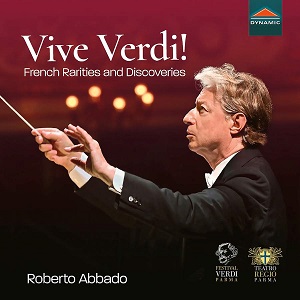
Giuseppe Verdi (1813-1901)
Vive Verdi! – French Rarities and Discoveries
Ludovic Tézier (baritone)
Chorus of the Teatro Comunale di Bologna
Chorus of the Teatro Reggio di Parma
Orchestra of the Teatro Comunale di Bologna, Filarmonica Arturo Toscanini/Roberto Abbado
rec. live, September 2021, Teatro Reggio di Parma; September 2020, Parco Ducale di Parma;
October 2018, Teatro Farnese di Parma
Includes a booklet with French text and English translation; notes in Italian, English.
DYNAMIC CDS7941 [67]
The secondary title of this CD is a bit misleading, in that not everything on the CD is a rarity in the strictest sense, and it contains only one real discovery. However, that one item in itself is a good reason to have put this out for the classical consumer, even if the majority of the CD contains material gathered from recordings that have been released previously by Dynamic.
The discovery is a roughly ten minute Ballet divertissement that Verdi composed for the first production of Nabucco in Brussels in 1848. The opera had been translated into French, hence the change in title to Nabuchodonosor. For this production Verdi was asked to create a Ballet for the Third Act. The music was recently identified among Verdi’s papers held at the Villa Verdi Sant’Agata by Knud Arne Jürgensen. If one consults the Ricordi website regarding this music, it mentions that there was possibly a third section to the ballet that did not survive. For this recording we are given the surviving Ballet and the opening chorus that leads into it. The music is a pleasing discovery although it will never be considered among Verdi’s most memorable music, even from among his ballets. There is a very beautiful section which highlights the solo cello, elegantly played here by Francesco Maria Parazzoli. This is followed by a lightly tripping Pas d’Ensemble that offers some dancing string figurations that hover over the restrained cello lines. The recording was made at the first modern performance of this music where it was dedicated to the celebrated Italian ballet dancer, Carla Fracci who passed away in May of 2021.
The tracks from Macbeth come from the recently released Dynamic recording of the premiere recording of the 1865 French version of Verdi’s Macbeth, reviewed in January by Ralph Moore. The 1865 Macbeth has been the most recorded version of this opera, so the rarity here is the French translation which Verdi used for that Paris production. Here we are given the majority of the Apparition scene including the second half of the Ballet, called the Dance of the Sylphs. This is followed by two choruses that occur in the final Act. Ludovic Tézier’s voice remains in remarkably robust health; there is the merest hint of a beat on some sustained notes, but his singing is notable for his clarity of line, diction and nobility of tone. The sound engineering also strikes me as being remarkable for something recorded at a live, open-air performance. Usually I find they make such disappointing listening experiences when captured on CD; however, all of this makes me want to investigate the complete set.
The last items on the Disc are a 25 minute ballet sequence that Verdi composed for the Paris premiere of Il trovatore in 1854. This lengthy piece was inserted at the beginning of the Third Act, just prior to Azucena’s capture by Ferrando and the Count di Luna’s men. In the first section, Verdi incorporates some of the orchestral introduction to the Anvil Chorus, while the music of the Chorus itself turns up a bit later in the ballet. There are a couple of nicely scored sections, one is a Polacca that includes some colourful sounding castanets, then in a later section, there is a really interesting use of Pizzicato strings in the Ballet’s most original-sounding music. This is not the first recording of the ballet; Richard Bonynge included it in the 1977 Decca recording with Luciano Pavarotti, Marilyn Horne, and Joan Sutherland (review). The version on this CD comes from Dynamic’s second recording of the complete French version, Le trouvère (review). Roberto Abbado shows off his strengths as a Verdi conductor in the works from all three operas. He finds a decent rapport with both orchestras which results in a relaxed flow of Verdi’s music, all the while presenting a very crisp ensemble. The sound engineering is excellent, and despite being recorded at separate live occasions, the listener is hard pressed to find any sonic differences between them.
I would not consider this an essential disc by any means. The Nabucco discovery is no more than a pleasant interlude and neither ballet is Verdi’s finest music for that genre. I consider the ballet from Otello to be his best work for dancers. As the rest of this disc’s contents are available elsewhere, no-one needs to race to the shops to purchase this. I suspect that this will appeal mostly to musicologists who wish to study Verdi’s music in depth. They will not be disappointed by what they discover on this release. Now that both Macbeth and Il trovatore have received recordings in their French versions, I can only hope that at long last we will see Dynamic, or some other company come out with the Paris version of Falstaff. Verdi made some very distinct changes to that score before he died, and it would be good to finally have them officially available on a commercial CD release.
Mike Parr
Help us financially by purchasing from



Contents
Nabuchodonosor (1848)
Comme le Dieu Bel, notre grande reine
Divertissement Macbeth (1865)
Choeur et Scène des Apparitions, Danse des Sylphes (Act 3)
Aux Anglais le traître contre moi – Honneurs, respect, tendresse (Act 4)
Introduction et choeur. Ô patrie! Ô noble terre (Act 4)
Le trouvère (1854)
Divertissement
Other artists
Francesco Maria Parazzoli (Cello)
Jacobo Ochoa (baritone)


















